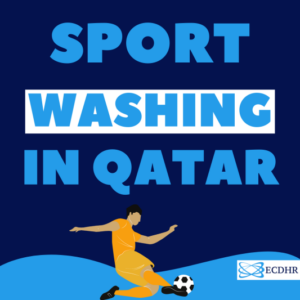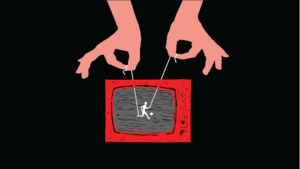For many of the world’s autocrats, the power of sportswashing lies in information manipulation—in the bankability of sports content to discredit, displace, and debase other kinds of content reaching audiences, says Sarath K. Ganji, a Penn Kemble Fellow at the National Endowment for Democracy (NED), formerly a strategy and transformation consultant with the U.S. State Department and a U.S. Fulbright Scholar based in the Arabian Gulf.
That content can come from any part of an audience’s infosphere, be it broadsheets, broadcasts, or Internet boards. But when that content runs counter to the desired images of autocrats, sports offer a way out. In Qatar’s case, that way out can take one of three forms, he writes for the Global Policy Journal:
-

European Centre for Democracy and Human Rights (ECDHR),
First, sports can discredit negative content by positioning trusted intermediaries to propagate alternate perspectives. These intermediaries are usually athletes and officials drawn from beyond the launderer’s borders—ones who can leverage their celebrity to spin negative coverage. Over the years, Qatar has built an impressive roster of intermediaries. English footballer David Beckham is one of them. ….. In 2019, for example, the footballer went on record praising Qatar’s stadiums and hotels and celebrating its World Cup for giving audiences “an opportunity to experience football in places you wouldn’t expect to visit.” This, despite widespread criticism of the country’s exploitative construction and hospitality sectors. In October, Beckham reportedly signed a multi-million-dollar deal to serve as an ambassador for Qatar’s World Cup, inviting additional chances for spin.
- Second, sports can displace negative content by shaping the media’s news agenda. Major sporting events benefit from selection bias in the media. Researchers from Uruguay discovered that when the country’s national football team advanced to the knock-out stages of the 2018 World Cup, local media temporarily shifted their reporting agenda away from content having to do with public accountability. Having hosted nearly 150 major sporting events since the 1970s, Qatar has had that many opportunities to alter media outlets’ reporting agendas. That appears to be happening even now, as reporters begin writing more World Cup stories not having to do with migrant rights.
-

Human Rights Foundation
Finally, sports can debase negative content by generating positive associations for beat-up brands. An important part of sports is the atmospheres—the experiences of shared emotion—that they elicit for audiences. A group of international researchers found that the atmospheres created during English Premier League matches could cultivate fan loyalties by transferring the emotions of these events to the logos and names of their sponsors. …. The World Cup presents an extraordinary opportunity for Qatar to use gameday emotions to rehab the country’s image.
Unless democratic actors take concerted action to hinder these moves, sportswashing may well prove a winning bet, Ganji concludes. RTWT
This strategy has proven to be remarkably effective in overhauling these states’ public images and legitimizing their regimes, The Guardian’s Karim Zidan observed.
At this year’s Oslo Freedom Forum (above), Zidan discussed sportswashing with labor rights activist and blogger Malcolm Bidali; Tibetan activist and community organizer Chemi Lhamo; and Lise Klaveness, President of the Norwegian Football Federation, lawyer, and human rights advocate.







